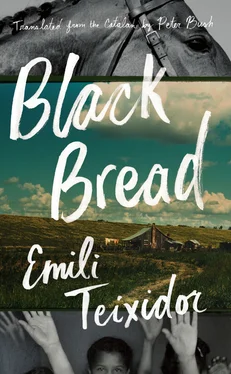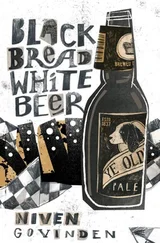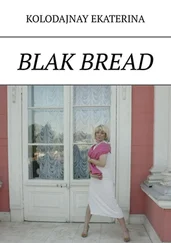“Well, I once heard about a shepherd dog”—each of us contributed their best-kept memories and on this occasion it was Oak-Leaf’s turn—“that stayed by its master’s side when he died of a heart attack in the middle of the woods, felled like a tree that had been axed, angina, and the dog didn’t eat or drink for over a week, barking this way and that to attract someone’s attention, until passing charcoal burners found them and took the dead man home with the dog trailing in his wake. Dogs never desert their masters.”
“When Grandmother was a young woman, they had a goat at home they called Nanny because she acted as her mother’s wet nurse, and reared her mother on the milk from her titty,” reminisced Quirze. “When her mother shouted to her, Nanny came into the house, went to the cradle and placed her titty so the baby could suck as much as it wanted. That way Grandmother could get on with other chores. Nanny suckled all Grandmother’s children: Andreu’s father, Núria’s father, my mother, Enriqueta, Uncle Bernat… everybody. And when Nanny died of old age, they all cried as if she were family. Grandfather Hand who’d not yet married Grandmother didn’t bury her, he skinned her and made three or four bags for drinking wine, milk and water. And even now when we have a drink and press the skin to make the liquid squirt out, the skin bleats, like Nanny’s maa-maa.”
“My father had a horse,” said Oak-Leaf, “that was very old and had worked hard its whole life until it was short of breath, so he let it do nothing but graze all day long in the meadow. Well this horse, when it saw the mares and young horses go by carrying heavy loads, it would go over and stand in front of them as if it wanted to help and followed them to where they had to unload and licked the sweat off their backs. He sensed they were tired and was helping them, even though he was so old he was almost blind. When he died they buried him on the quiet so the other animals didn’t see, but when night fell and the other animals returned to their stables and couldn’t find him, they started to whinny softly as if they were crying.”
At the end of each story we stayed silent as if savouring and digesting the mysteries of these animals who had feelings like ours. We were all in contact with dogs, horses and chickens, and even Quirze appreciated their loyalty and was delighted when they jumped up and gave him a welcoming nuzzle.
Once we’d run out of stories, the ghost of that dead horse returned to fill the gap in our conversation.
“So you say the Civil Guard came to your house, right?” asked Oak-Leaf.
“Yes, they came at midday, at lunchtime…” I replied.
“To see if they could land the burial on us,” added Quirze.
“Where can it have come from? Horses don’t go off and get lost as easily as that…” Oak-Leaf asserted.
Quirze shrugged his shoulders.
“There’s one civil guard who knows every hideout and corner of the woods. He’s tall, young, fair, with a moustache.”
“We didn’t see him,” I said. “We only recognized Martínez, the one in charge.”
“They call him Canary because he comes from the Canary Islands. And Freckly Fair because he likes larking about. He’s a real live wire. He’s always with another one they call Curly Lettuce, who’s also very handsome. The others are tall and have such huge paunches I don’t know how they can walk all day long as they do. They’re always panting and hanging out their tongues.”
“My father says they’re good for nothing,” said Quirze, “that they’re a load of layabouts who suck money and blood like ticks. You tell me what use they are if they don’t do a blind thing all day.”
“They keep an eye out,” said Oak-Leaf, “so there’s no thieving or fighting.”
“The other day you said you’d caught Charcoal Pete stealing in the middle of the woods,” Quirze whooped. “They’re not that eagle-eyed.”
Oak-Leaf felt deflated. Cry-Baby and I laughed.
“They’re not always keeping an eye out,” she protested. “They sometimes relax, have a siesta… Nobody can see them in the middle of the woods, so they do whatever they feel like… I once saw Canary by himself taking his clothes off and swimming in the river…”
“Did you really see him swimming?”
“And what was the other one doing?”
“He was by himself, they must have split up. Or maybe he was keeping a lookout further up so they didn’t surprise his mate in the water.”
“Was it Canary?” reacted Quirze, intrigued. “Did you see him stark naked?”
Oak-Leaf looked down, as she always did when something embarrassed her or she wanted to ask a favour.
“It wasn’t the first time…”
“You’re making this up,” Quirze retorted. “You’re a liar.”
“Don’t believe me then. I’ve seen him several times… lying on the ground sunbathing. As he comes from the Canaries, I expect he misses the sun and doesn’t want his skin turning white.”
“Does he strip off only to sunbathe?” asked Cry-Baby who chimed in now and then.
“And to swim in the river, when it’s hot, I just told you.”
“If we’re going to believe you, everybody runs around these woods stark naked!” said Quirze, turning the screw.
“No, only mad Antònia and him, but it’s different. Canary’s not mad. Antònia doesn’t know what she’s doing.”
“What’s so different, if they’re both in their birthday suits?”
“What else? Come on, tell us. What else does Canary do?”
Oak-Leaf sprang to her feet. “I must go. I’ll tell you another day.”
“You always do this!” I protested. “You’re one big tease.”
“He’s a man and she’s a woman, it’s hardly the same. I’ll tell you some other time.”
“How wonderful! How mysterious! He’s a man and she’s a woman! Men’s peckers droop and women have tits and a fanny, that’s the big difference.”
“You’re disgusting, Quirze!”
“And you’re a lying cow!”
“There are lots of things I can’t tell.”
“You’re a piss-pot!”
Oak-Leaf ran home while Quirze screamed after her: “That’s what the teacher always says: ‘Oak-Leaf’s a piss-pot!’”
“That’s a lie!” She swung round, still running. “Mr. Madern doesn’t call me Oak-Leaf. He calls me by my proper name, Elisa. Elisa. My real name.”
“Oh, really!” Quirze mocked the fleeing girl’s voice. “Elisa! How lovely, Elisa! Call her Elisa, that’s so posh. Oak-Leaf, rather than Oak-Leaf, you stink of dung and glue!”
And he began to shout and murder that song:
“The man who teaches me
fell in love with me
fol-de-rum, fol-de-ree!
Fell in love with Elisa,
saying, don’t you be a nun,
you’re going to marry me,
fol-de-rum, fol-de-ree!
The teacher’ll marry
Elisa Oak-Leafie!”
Nobody mentioned the horse again, it was as if we had never seen it. Dad Quirze was grumpier than usual. If it was difficult to get a word out of him before, he now acted like a dumb mute after that shouting match with the local dignitaries. As if their visitation had passed on a disease that was silently eating away his insides.
On one of the few days he was on the farm with his flock, Grandfather Hand bumped into him on the porch, just as we three were leaving for class with our satchels, and he talked to him as if he were a stranger.
“Watch out for the scoopers, they’re a scheming bunch. They’re a stinking lot. And those other bigwigs are nasty too. They all live on cushy handouts.”
“Bigwig” in Grandfather’s language was any person of authority who didn’t deserve the place he occupied, that he’d simply inherited.
Читать дальше












